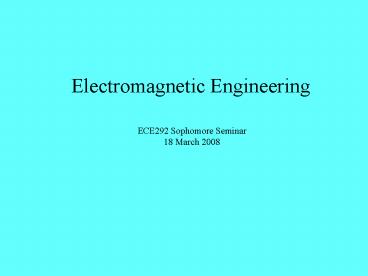Electromagnetic Engineering - PowerPoint PPT Presentation
1 / 26
Title:
Electromagnetic Engineering
Description:
vector and Poynting's Theorem; Wave equation with solutions (vector and scalar, ... Poynting Theorem, EM Radiation and the Far-Field, Reciprocity, ... – PowerPoint PPT presentation
Number of Views:961
Avg rating:3.0/5.0
Title: Electromagnetic Engineering
1
Electromagnetic Engineering
ECE292 Sophomore Seminar 18 March 2008
2
What is Electromagnetics?
The study and application of electric and
magnetic fields
Electrical Engineering is Applied
Electromagnetics
- - Circuit Theory
- - Kirchhoffs Voltage and Current Laws
- - Current
- - Resistance
- - Capacitance
- - Inductance
- - Voltage
- Electric and Magnetic Energy
- Power, Electric Machines
- Antennas, Waves and Wave Propagation, Optics
- and Optical Computing
3
Why Electromagnetics?
Electrical Engineering is Applied Electromagnetics
- As devices get smaller and smaller, and
frequencies get higher and higher, - circuit theory is less able to adequately
describe the performance or to - predict the operation of circuits.
- At very high frequencies, transmission line and
guided wave theory must - be used - high speed electronics, micro/nano
electronics, integrated circuits. - Other applications of Electromagnetics -
- Fiber Optics
- Microwave Communication Systems
- Antennas and wave propagation
- Optical Computing
- Electromagnetic Interference, Electromagnetic
Compatibility - Biology and Medicine/Medical Imaging
4
Why Electromagnetics?
- As use of the electromagnetic frequency spectrum
increases, the - demand for engineers who have practical
working knowledge - in the area of electromagnetics continues to
grow.
- Electromagnetic engineers design high frequency
or optoelectronic - circuits, antennas and waveguides design
electrical circuits that - will function properly in the presence of
external interference - while not interfering with other equipment.
- The electromagnetics technical specialty
prepares future engineers - for employment in industry in the areas of
radar, antennas, fiber - optics, high frequency circuits,
electromagnetic compatibility - and microwave communication.
5
Faculty
Dave Atkinson
Jeff Young
Dennis Sullivan
Others include
Fred Barlow,
Aicha Elshabini,
Dave Egolf, and
Rick Wells
6
Examples of Electromagnetics
7
(No Transcript)
8
(No Transcript)
9
(No Transcript)
10
(No Transcript)
11
(No Transcript)
12
(No Transcript)
13
(No Transcript)
14
(No Transcript)
15
(No Transcript)
16
(No Transcript)
17
(No Transcript)
18
(No Transcript)
19
(No Transcript)
20
(No Transcript)
21
Classes in Electromagnetics
ECE330 Electromagnetic Theory (3 cr) Vector Math,
Charge and current, fields as forces, work,
potential, and electromotive force, Faradays
Law, Gausss and Amperes Law, Material
Modeling, Waves. Prereq Math 275, 310, and Phys
212. Coreq ECE331 Semesters Fall,
Spring ECE331 Electromagnetics Laboratory (1 cr)
Lab experiments and computer simulations. One
3-hr lab per week. Prereq Math 275, 310, and
Phys 212. Coreq ECE330 Semesters Fall, Spring
22
Classes in Electromagnetics
ECE430 Microwave Millimeter Wave Circuits (3 cr)
Telegraphers and wave equations characteristic
impedance, wave velocity and wave number
physical transmission lines, including coax,
microstrip and stripline circuit analysis
techniques, reflection coefficient and power
flow, impedance analysis, impedance matching
techniques and Smith Chart S-parameters,
Wilkinson power dividers, circulators and hybrid
couplers transformers and filters Prereq
ECE330 Semesters Fall, 2009 Spring,
2011 ECE432 Applications of Electromagnetic
Theory Maxwells equations Poyntings vector and
Poyntings Theorem Wave equation with solutions
(vector and scalar, homogeneous and
inhomogeneous), Helmholtz equation plane waves,
reflection and refraction introduction to
classical electrodynamics, radiation from
accelerated charges, introduction to antenna
theory, transmission lines, waveguides and fiber
optics, etc. Prereq ECE330 Semesters Fall,
2008 Spring, 2010
23
Classes in Electromagnetics
ECE433 Antenna Theory (3 cr) Maxwells Equations,
Potential Theory, Poynting Theorem, EM Radiation
and the Far-Field, Reciprocity, Pattern, Gain,
Directivity, Efficiency, Beamwidth, Bandwidth,
Side-Lobe Level, Line Sources, Lineal Phased
Arrays, Antenna Structures Dipoles, Loops,
Helix, Horns, Patches Prereq ECE330 Semesters
Spring, 2009 Spring, 2011
24
Classes in Electromagnetics
ECE530 Advanced Electromagnetic Theory (3 cr)
Maxwells equations, potential theory, wave
propagation and scattering, canonical problems,
guided wave theory, antenna concepts, boundary
value problems. Prereq ECE432 Semester
Fall ECE533 Antenna Theory (3 cr) Maxwells
equations, reciprocity, equivalence theorems,
wire antennas, antenna arrays, aperture antennas,
analysis and design techniques, hardware
considerations. Prereq ECE432 Semester Spring
25
Classes in Electromagnetics
ECE536 Wave Propagation and Scattering (3
cr) ECE538 Electromagnetic Simulation (3
cr) ECE539 Advanced Topics in Electromagnetics
(3 cr) Prereq ECE530
26
(No Transcript)































